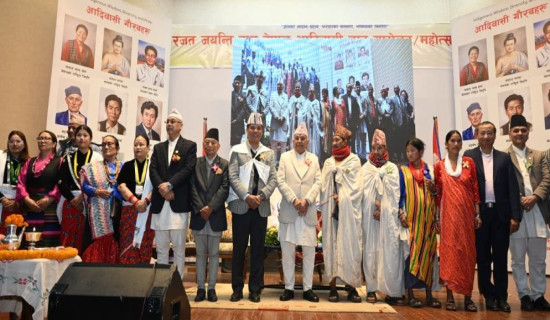- Monday, 9 February 2026
Karnali most vulnerable to climate change effects
Mugu (Rara), Oct. 22: Karnali Province in Nepal is regarded as one of the regions most vulnerable to the impacts of climate change due to its mountainous terrain, fragile ecosystems and socioeconomic conditions.
In response, the Ministry of Forest and Environment, in collaboration with Sathsathai (an organisation working on climate change), jointly organised a two-day conclave titled Bridging Karnali and the Globe: Roadmap to COP 29 on the vicinity of Rara Lake to raise awareness about the impacts of climate change and the adaptation process across the 10 districts of Karnali Province.
During the programme, Minister for Forest and Environment Ain Bahadur Shahi Thakuri, also from Karnali Province, stressed the urgent need for adaptation strategies to protect the livelihoods and well-being of local communities while preserving the province's unique environment.
Minister Thakuri explained that the conclave was part of a series aimed at gathering problems and suggestions from the local level to present at the upcoming COP 29, which will be held in Baku, Azerbaijan, from November 11 to 22, 2024.
He also acknowledged the province's climate-related challenges, highlighting Mugu as particularly vulnerable due to its hosting of Rara Lake, a beautiful site designated as a Ramsar wetland of international importance.
During the two-day programme, 200 people from civil society, local representatives, experts, environmentalist government officials and concerned authorities participated.
The programme concluded with a 5-point Karnali Declaration on Sunday focusing on preparations for COP 29 and the impacts and opportunities of climate change in Karnali Province. The five-point declaration, issued on Sunday, highlighted that Nepal as a whole is at high risk due to climate change, with Karnali Province being particularly vulnerable and having limited capacity to cope with the challenges posed by climate change.
The declaration called for prioritising climate-related risk management and the implementation of climate-friendly activities as part of the regular development programmes undertaken by local, provincial and federal governments.
It also emphasised the need to address the impacts of climate change on women, children, youth and marginalised communities and to raise these issues with international prominence, particularly focusing on climate justice.
The declaration stressed the importance of international cooperation to help Nepal tackle the impacts of climate change and seize climate-friendly development opportunities. It highlighted the need for scientific documentation of the effects of climate change on local livelihoods and natural disasters, along with enhancing the capacities of national, provincial and local governments in risk management and impact mitigation.
The declaration called for special efforts at the upcoming COP 29 to address the need for climate finance to support the implementation of climate-resilient programmes and to address the impacts of climate change in Nepal.








-square-thumb.jpg)








